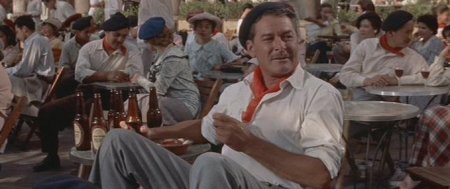
Wednesday
Here’s a literary citation that reminds us of the usefulness of an extensive literary background when writing about politics. Attempting to assess Donald Trump’s future, New Yorker’s John Cassady turns to Ernest Hemingway’s The Sun Also Rises.
[S]omeone asks Mike Campbell, the troubled Scottish war veteran who is engaged to Lady Brett Ashley, how he ended up bankrupt. “Two ways,” Campbell replies. “Gradually, and then suddenly.” Campbell’s interlocutor goes on to ask what brought about his collapse. “Friends,” Campbell says. “I had a lot of friends. False friends. Then I had creditors, too. Probably had more creditors than anybody in England.”
We’ll get a chance to see, during the upcoming impeachment trial and then in the ensuing months, how many of those who supported and enabled the president are false friends. Given that most of them, like their leader, are purely transactional, we’ll recognize their falsity only to the extent that Trump’s influence declines. Unfortunately, given that the it will probably be perceived self-interest rather than principle that decides. But it’s clear that economically, Trump’s creditors are beginning to kick back.
And further on:
[I]n the week since Trump incited a mob of his supporters to attack the Capitol, he and his businesses have suffered a series of blows. Key corporate partners have abandoned him; some of his fellow-billionaires have spoken out against his sedition; Deutsche Bank has let it be known that it doesn’t want anything more to do with him; and Twitter stripped him of his following. When Trump leaves the White House, next week, he may have his eyes on planning a return to the political stage, but surely his first priority will be stabilizing his business empire—if he can manage it.
If the corporate shunning of Trump persists and expands to other businesses owned by him, it could do immense damage. Trump’s hotels and resorts, such as the Trump National Doral, in Miami, depend on big businesses to fill their ballrooms and function spaces. They also rely on wealthy individuals to book the tee times, hotel rooms, and weddings that provide daily revenues. His condo developments cater to wealthy buyers. Other Trump ventures, particularly his licensing deals around the world, are even more dependent on the enduring appeal of the Trump brand, which is now in question.
Trump and Campbell have one other thing in common, which is their fragile masculinity. The resemblances end there, however, as Campbell has contempt for medals (whereas Trump longs for them), is self-deprecating (enough said on that score), and drinks heavily (whereas Trump doesn’t drink at all). Also unlike Trump, he’s a good companion (when he’s doesn’t get too drunk) who wears his humanity on his sleeve, especially in his longing for Lady Ashley Brett.
On the other hand, Trump is very much like the father (Rick) in a John le Carré novel I’m reading at the moment. (A friend recommended A Perfect Spy to me after le Carré’s recent death.) Here’s a recollection written by Rick’s son, who refers to his childhood self as Pym. It describes Rick and his black market activities during World War II (which Rick escaped as neatly as Trump escaped Vietnam):
Rick’s superiority was manifest in everything he did. In the way he dressed even when we were very broke, his clean laundry and clean shoes. In the food he required and the style to eat it in. The rooms he had in the hotel. In the way he needed brandy for his snooker, and scared everyone into silence with his brooding…
Meanwhile we traded. What in, Pym never rightly knew and nor do I now. Sometimes in rare commodities, such as hams and whisky, sometimes in promises, which the court called faith. Other times in nothing more solid than the sunny horizons that sparkled ahead of us down the empty wartime roads.
Rick also makes a fortune at one point with a fraudulent insurance scheme, using his charm to sell policies to the elderly. At another point he gets money for buildings during the war (but gets caught when one of the buildings proves to be undamaged).
I thought of Trump steaks, Trump University, and Trump presidential promises. Rick’s weakness for horses also reminds us of Trump’s longing to be the owner of a football franchise.
Supposedly le Carré modeled Rick on his own father. After four years of Trump, we know he knows whereof he speaks.

